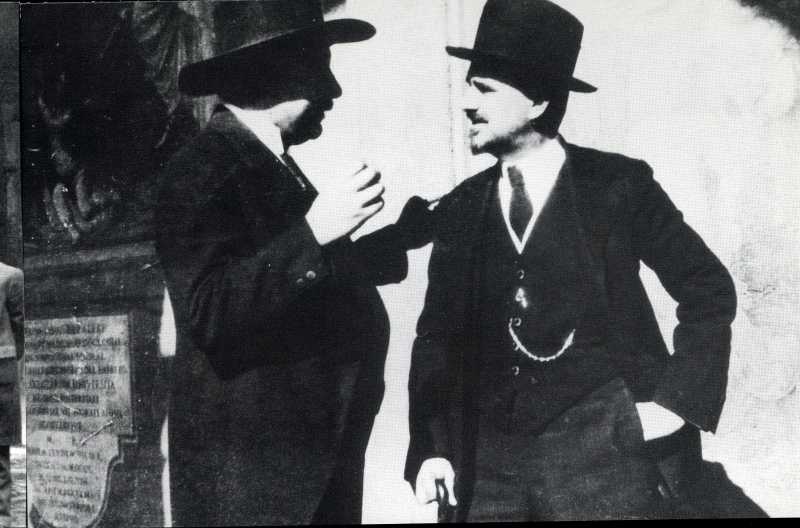In memory of Federigo Enriques (1871 - 1946)
Accademia Nazionale dei Lincei, Rome, October 14, 2016

Federigo Enriques and Albert Einstein debating
|
Ideas on Geometry and Science
In memory of Federigo Enriques (1871 - 1946) Accademia Nazionale dei Lincei, Rome, October 14, 2016 |  Federigo Enriques and Albert Einstein debating |
From the fields of geometryto philosophy and history of science Umberto Bottazzini (Università di Milano) In the Preface to his Problemi della scienza (1906) Enriques confessed he had been led from the fields of geometryto discuss the building up of a science of knowledgeby his faith in scientific philosophy. This book marked the beginning of his increasing involvement in the philosophical debate, and in the cultural life of Italy as well. Enriques co-founded the journal Rivista di Scienza (1907, later Scientia) and then, in his capacity of President of the Italian Philosophical Society, he organized the IV International Congress of Philosophy (Bologna, 1911) which gave rise to a lively, public polemics with Italian idealist philosophers, especially with B. Croce. After WWI and his move to Rome, facing the success of idealist philosophy in Italy Enriques found attentive readers abroad, in France in particular. At the same time he turned his interests more and more toward the history of science up to 1938, when the racial laws banished him from teaching and from any academic life. |
The P12 theorem and the beauty of surfaces classification
Fabrizio Catanese (Universität Bayreuth) I shall try to explain the classification theorem of algebraic surfaces, also for non specialists; at the beginning the only thing one has to understand is that 12 is the least common multiple of 3, 4 and 6. Then there comes some more interesting arithmetic, discovered by Enriques in 1914. While Mumford and Bombieri extended the classification theorem to algebraically closed fields of positive characteristics, the P12 theorem is still an open question. Time permitting, I shall discuss work in progress with Binru Li on the subject. |
|
Enriques' << Battle >> for a Scientific Humanitas and its Effects on Mathematics Education Livia Giacardi (Università di Torino) I will illustrate Federigo Enriques's vast, multifaceted efforts to improve the preparation of mathematics teachers, situating them in their historic context and within the framework of the cultural project that formed the basis of his whole scientific output. Firstly I will show how Enriques's project for the creation of a scientific humanitas, which was rooted in the philosophy and history of science, developed gradually during his years in Bologna, and how this was reflected in his vision of mathematics teaching. The influence of Felix Klein will also be highlighted. Secondly Enriques's involvement in teacher training and the various strategies he adopted will be considered, focusing attention on the increasing role of the history of science and on Enriques's openness to international dialogue in opposition to all forms of nationalistic isolation during Fascism. |
On Enriques' Work and Times: Perspectives from Germany David Rowe (Johannes Gutenberg-Universität Mainz) Among the many links that joined Italian and German mathematicians over a century ago, those involving Enriques were among the most interesting. On the one hand, his work on algebraic surfaces stood in a direct line with earlier work in birational geometry undertaken by Clebsch and Max Noether. On the other, his textbook on projective geometry and his article Principles of Geometryfor the Encyklopädie der mathematischen Wissenschaften reflect Enriques' strong affinities with the tradition of Felix Klein. Finally, some of Enriques' most important philosophical and historical writings were translated into German and were widely discussed during his lifetime. While touching on these aspects relating to appreciation of Enriques' work, this talk aims to highlight his unique impact on intellectual discourse in Germany. |
|
Rationality and irrationality
Yuri Tschinkel (New York University) I will discuss recent developments in the study of rationality in algebra and algebraic geometry. |